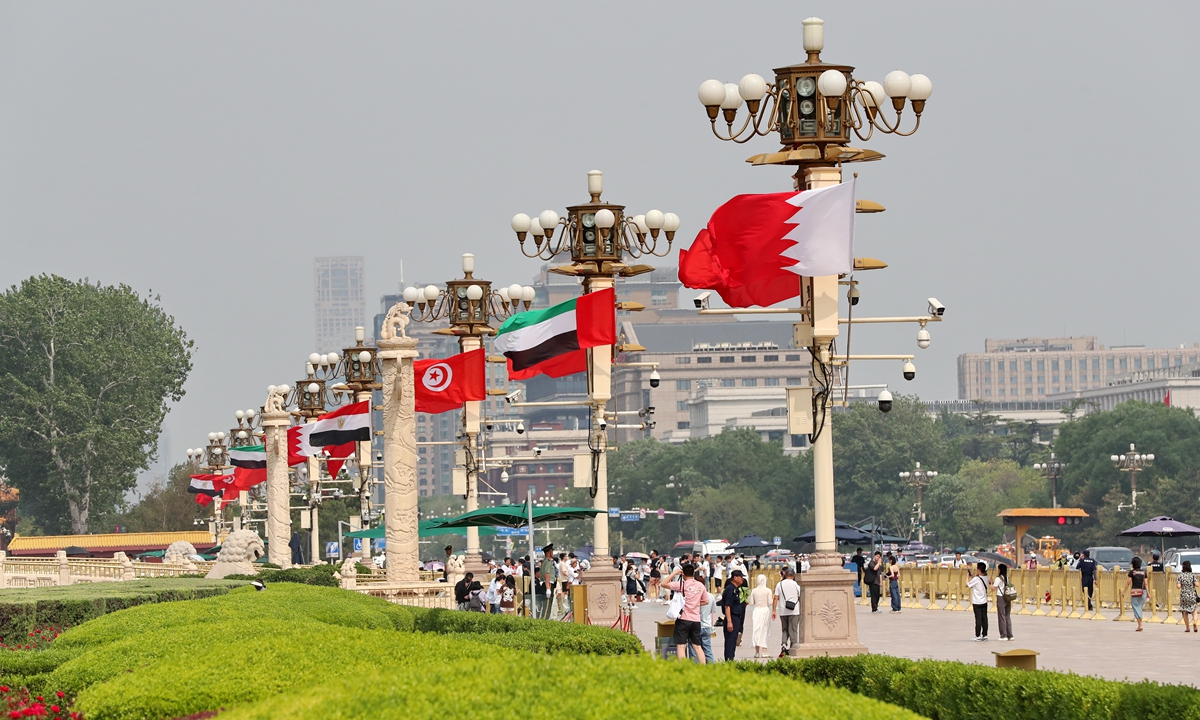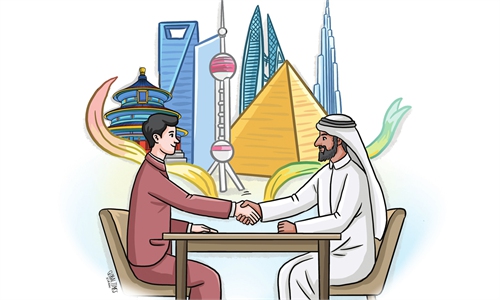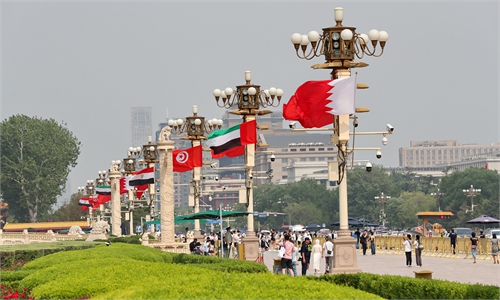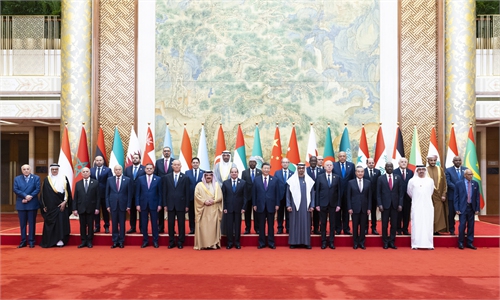
Flags hang in Tian'anmen Square on May 29, 2024 to welcome Bahrain's King Hamad bin Isa Al Khalifa, Egypt's President Abdel Fattah El-Sisi, Tunisia's President Kais Saied, and United Arab Emirates' President Sheikh Mohamed bin Zayed Al Nahyan on their state visit to China. Photo: VCG
The 10th Ministerial Conference of the China-Arab States Cooperation Forum was held in Beijing on Thursday. This year marks the 20th anniversary of the forum. Over the last 20 years, China-Arab relations have improved steadily. The huge attendance at this year's meeting of senior Arab leaders, including four heads of state and tens of ministers from important sectors such as energy, investment and industry, has sent important signals about the strategic significance and future direction of China-Arab relations.The current China-Arab meetings have happened at a crucial time in the world. As the Arabs and Chinese discussed their strategic interests in Beijing, they were cognizant of the massive changes occurring in their respective regions and the world. The Arabs consider China a positive player in global and regional affairs. They appreciate the important role China played in brokering Saudi-Iran reconciliation and its efforts to end the Gaza conflict. The current China-Arab relations are the deepest, the most strategic, the most advanced and the most promising in their entire history. Because of their huge potential and synergy, China-Arab relations still have a lot of room for growth.
The Arabs view China's economic model and governance philosophy as a success story worth learning from. China's "socialism with Chinese characteristics" system has proven effective and suitable for Chinese society, culture and aspirations. China's achievements over the last 40 years give the Arabs useful insights that they can also adopt a model that works best for their needs - rather than importing a foreign straitjacket. Just as China contributed positively and enormously to the world and humanity in previous millennia, the Arabs expect China to continue to be a major contributor in current times and in the future.
China's image continues to be positive in the Arab world. The Arabs see China as a responsible major power and the ballast of the present turbulent world, where the international system's anchors are dangerously weakening, the law of the jungle is creeping back, calls for deglobalization are getting louder and protectionist walls are rising.
The two sides are completely aligned on their core interests such as territorial integrity and sovereignty, including the Palestine issue and the Taiwan question. The Arabs fully support and openly embrace the one-China principle and consider Taiwan an integral part of the People's Republic of China. Furthermore, the Chinese explicitly back the Palestinians' legitimate right to self-determination; they regularly speak up for the two-State solution and demand a Palestinian state based on the 1967 borders with East Jerusalem as its capital be established. They agree that a peaceful settlement of the two questions is the only way to maintain stability in their respective regions and the world.
The current meetings in Beijing repudiate some foreign pundits' claims that China-Arab relations are momentary and transactional; they prove that China-Arab relations are strategic and long-term. The growing number of China-Arab joint ventures demonstrates the strategic level and the long-term nature of their relations.
The Arabs support China's various global initiatives, including those related to global security and civilization. The Arab countries have warmly embraced and actively participated in the China-proposed Belt and Road Initiative (BRI). Also, they have pledged financial contributions to the initiative through various BRI investment vehicles such as the Silk Road Fund and Asian Infrastructure Investment Bank.
They recognize the significance of this major initiative and understand that a solid China-Arab partnership through the BRI contributes positively to their economic growth. Their historical people-to-people ties, similarities in development models and complementary strengths are bringing the Arabs and Chinese closer together. Both sides are eager to strengthen this growing partnership, which facilitates deeper collaboration in many areas.
The Arab and Chinese leaders have sent three clear messages to the world from Beijing. The first message is that the Arabs and Chinese are taking their relations to new heights and that they will work to further deepen and expand their strategic partnership.
The second is that the Arabs and Chinese will support each other on their core issues such as a two-State solution for Palestine based on 1967 borders, and Taiwan's reunification with the motherland based on the one-China principle.
The third message is that the two sides are working together to create a better regional order, while joining forces to help improve the current dysfunctional international system. Coming from two friendly ancient civilizations, the Arabs and Chinese are growing more confident about their place and prospects in the world. They deal with each other based on mutual trust and respect, and a willingness to support each other to assume their rightful place in the world. They have vowed to take necessary measures to make the world order more just, representative, democratic and balanced, while safeguarding regional stability, security and prosperity.
The author is former adviser to the chairman of the Abu Dhabi Executive Office, an authority responsible for Abu Dhabi's long-term strategies, and former head of the strategy division of Abu Dhabi National Oil Company. He is currently a visiting scholar at the Asia Global Institute of the University of Hong Kong. opinion@globaltimes.com.cn



